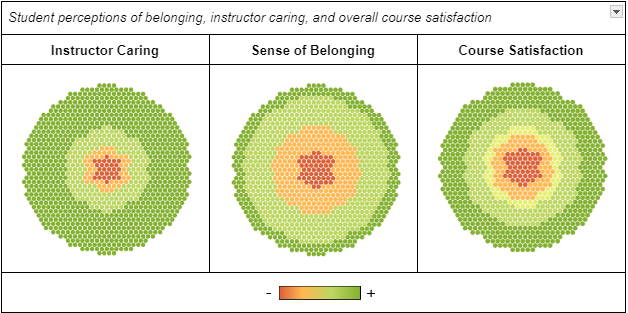Collaborative Research Highlights Value of Inclusive Course Design in Fostering Student Success

Initial findings of new research conducted jointly by DELTA Research and the Office for Faculty Excellence suggest a strong correlation between inclusive teaching practices and positive outcomes for students including increased feelings of belonging, perceptions of instructor caring, overall course satisfaction and course performance.
The research project, Capturing the Online Student Experience: Course Belonging, Community and Teaching Practices, examines students’ understanding of how course design promotes an inclusive classroom community that emphasizes student success and course satisfaction. Initial findings were presented at the 2024 NC State Conference on Faculty Excellence.
Through this ongoing work, the researchers hope to gain a better understanding of potential barriers to student well-being in virtual educational environments. Their findings will inform actionable insights for praxis to empower instructors in their use of inclusive course design and pedagogical practice.
“Our research directly informs how we support faculty excellence at NC State,” said Melvin “Jai” Jackson, Assistant Vice Provost for Faculty Engagement and a member of the research team. “By understanding the critical role inclusive pedagogical practice plays in the student experience, we can better equip our faculty with the tools and insights necessary to foster inclusive and supportive classroom environments — ultimately leading to greater academic achievement and well-being for all students.”
The project is led by DELTA Research Specialist Caranda Shubrick. A doctoral student in the NC State College of Education Educational Leadership, Policy and Human Development program and a longtime humanitarian and champion for social change, Shubrick is deeply invested in investigating inclusive pedagogies in online learning environments.

“Caranda’s leadership in this research project has been transformative, bringing a deep understanding of belonging and its impact on students and faculty,” said Jackson. “Her contributions testify to the importance of interdisciplinary collaboration in advancing our educational mission at NC State.”
In addition to Shubrick and Jackson, the research team includes Dan Spencer, DELTA Research Scholar, and Alin Yalcinkaya, DELTA Postdoctoral Researcher.
Evaluating Student Perceptions of Virtual Learning
The COVID-19 pandemic introduced students from pre-K through post-doc to learning in virtual environments. While these environments were primarily emergency remote learning situations, post-pandemic trends in higher education indicate that greater numbers of students are engaging in virtual learning opportunities.
With the exponential growth in online learning has come an increased, and urgent, need for understanding the student experience in virtual learning environments.
Shubrick was prompted to explore distance learning and the use of course technology after her own experience during the COVID-19 pandemic.
“The peaks and valleys of my doctoral journey have inspired me to delve deeper into distance learning through the lens of inclusive teaching pedagogies,” she explained. “As administrators, designers, and instructors in virtual learning settings transition into this new era of high-quality online education, it is vitally important for the student voice to be heard and integrated.”
“NC State has prioritized student well-being and has worked hard to use the student perspective to enact institutional change,” she continued. “However, we need to more clearly define the scope of our students’ perceptions of online and hybrid course design and instruction.”
Research Scope: Fostering Inclusive Teaching in Virtual Learning Environments
Employing teaching practices that meet the needs of all students ensures an inclusive learning environment that validates students’ existing modalities, backgrounds and previous knowledge while prioritizing their success.
Considerable research demonstrates that college students who believe that instructors and administrators care about their personal and professional success have better academic outcomes, fare better on persistence to completion and are more engaged with their communities. The perception of instructor caring translates to a strong sense of connection with their institution, which research suggests may have a longitudinal effect that persists well past graduation.
“From student persistence, to academic performance, to student motivation, to effective use of university resources, to attendance — belonging is related to a host of educational outcomes and markers of student success,” said DeLeon Gray, associate professor of educational psychology and equity in the NC State College of Education. “It is a fundamental psychological need for people of all nationalities, cultures and backgrounds to feel that this space (whether a virtual or in-person learning environment) is for them.”

Gray, whose research explores school belonging and student motivation, understands the urgency of investigation into this space. “Research on the belonging experiences of students in hybrid and online classes is especially important for providing guidance and training to university instructors on effective strategies for ensuring that students feel accepted, respected, included and supported,” he explained.
And with the U.S. Surgeon General last year declaring loneliness a national epidemic, Gray said, “Investigating belonging is far more than a ripe area for discipline-guided inquiry — it’s an area of national importance.”
This is where Shubrick and her research team come in. They hope to inform better pedagogical practices through their careful investigation of the predictive power of inclusive teaching perceptions on course quality, sense of belonging and barriers to learning.
“Our primary goal is to provide resources to help distance education faculty and students build stronger connections and maximize their course experience by reducing barriers to student satisfaction,” explained Shubrick. “The work I am fortunate to be a part of seeks to ensure that research efforts within DELTA align with the practical needs of course designers and instructors through targeted research on broader digital educational themes.”
Research Methodology and Findings
Seeking to answer the questions of what students experience in online or virtual courses and how those experiences differ based on identity, the research team employed a two-phase explanatory sequential mixed methods survey design.
Phase 1 of the data collection was conducted during the 2023-2024 academic year. Of a total of 15,740 students enrolled in online or hybrid courses, approximately 1,200 responded to a survey request. Plans are ongoing to conduct qualitative research as part of phase 2 of the study design for the 2024-2025 academic year.
Given the relatively low survey response rate, only preliminary comparisons can be made on the differences in perceptions of belonging among students with different identity markers.
Initial survey results found that students varied in their perceptions of whether their instructors fostered a sense of belonging and engaged in inclusive teaching practices in their course. There was also a range of perceptions about what, if any, constructs posed barriers to learning.

However, students demonstrated positive perceptions of both instructor caring and course satisfaction. Controlling for both student-centered (prior experience, gender, race and academic level) and course-centered (course level, size/enrollment and format) variables, those who perceived their course to have more inclusive teaching practices associated the course with greater levels of belonging, instructor caring, course satisfaction, overall course grade and fewer barriers to success.
Along with previously collected data, new data collected this fall will be analyzed to inform the design and analysis of qualitative interview and focus group surveys.
While more robust data sets will be needed to substantiate these findings, the initial data suggest reason to be optimistic about the value, for online and hybrid course instructors, of prioritizing student belonging in virtual class communities through intentionally inclusive course design practices.
Shubrick is excited to continue working in this space as the project enters its second year — and she is uniquely well-positioned to do so. “Caranda’s professional background in distance learning, higher education, social work and community work make her ideally equipped with the training and professional networks to address complex research problems of belonging in virtual environments,” said Gray.
He continued, “The conceptual, methodological and tangible insights emerging from her work will provide concrete guidance for university instructors during this critical period in the history of schooling in the United States.”
DELTA Research and Analysis leads the design, collection and analysis of actionable data for projects aimed at the transformation of digital teaching and learning. Discover how the DELTA Research and Analysis team can support your teaching.
- Categories:


